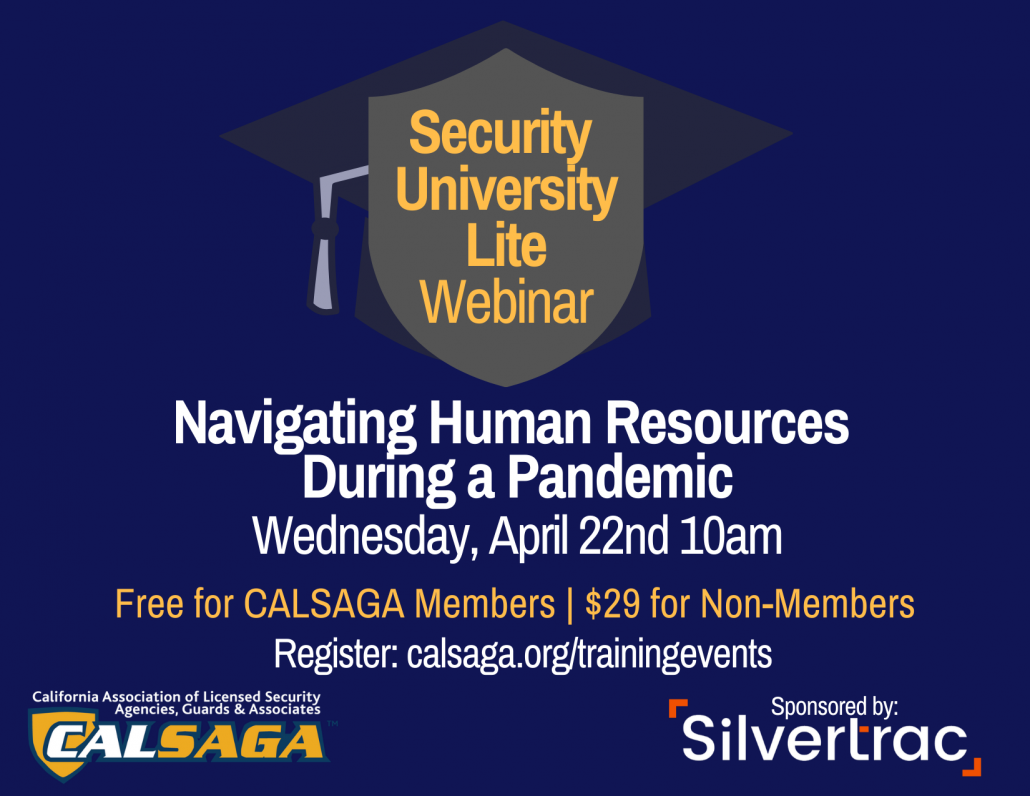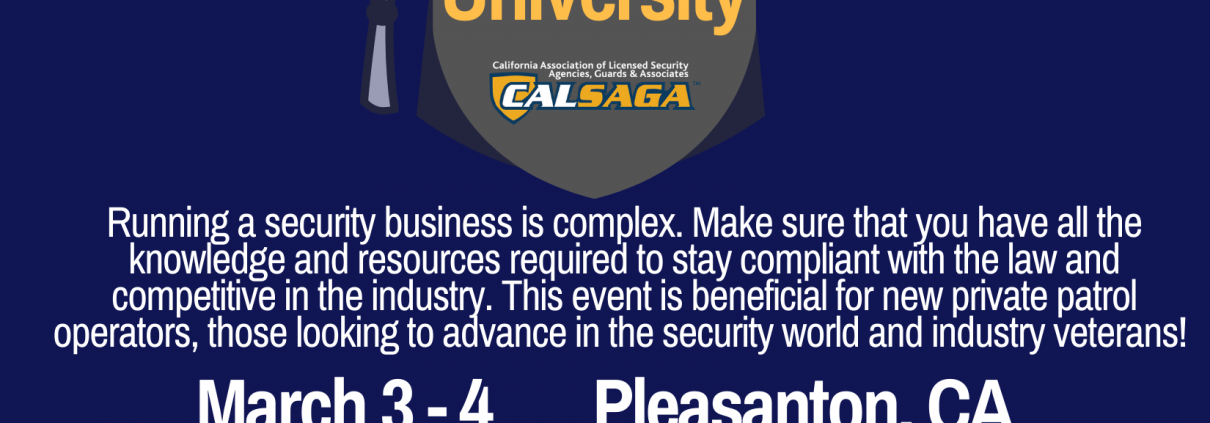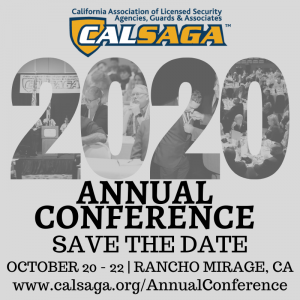As an association we strive to keep you up-to-date on relevant information for your business. Please review the information and links to resources below.
In a press conference this week Governor Gavin Newsom stated that there is no established timeline for removing the shelter-in-place order.
While the state has not mandated the use of masks, many cities and counties are enforcing restrictions. View a list of Local Orders/Ordinances Requiring the Wearing of Face Coverings.
If your business operates in San Francisco, San Jose and/or Los Angeles please make sure to review the information below regarding city-specific leave information. Please note that this is not meant to be an all inclusive list but rather information that has come to our attention we felt our membership would benefit from.
- San Francisco Emergency Paid Leave Guidelines
- San Jose Urgency Paid Sick Leave Ordinance
- Los Angeles Supplemental Paid Sick Leave
_ _ _ _ _ _ _ _ _ _ _ _ _ _ _ _ _ _ _ _ _ _ _ _ _ _ _ _ _ _ _ _ _ _ _ _ _ _ _ _ _ _ _ _ _ _ _ _
Thank you to those who joined us on April 22nd for CALSAGA’s first Security University Lite Webinar: Navigating Human Resources During a Pandemic.
Please save the date for the next Security University Lite Webinar which will take place Wednesday, May 20th at 10am. Details and registration will be available soon.
_ _ _ _ _ _ _ _ _ _ _ _ _ _ _ _ _ _ _ _ _ _ _ _ _ _ _ _ _ _ _ _ _ _ _ _ _ _ _ _ _ _ _ _ _ _ _ _
COVID-19 Updates from CALSAGA
Don’t wait to register for our upcoming webinar!
Register for the Live Webinar Now
_ _ _ _ _ _ _ _ _ _ _ _ _ _ _ _ _ _ _ _ _ _ _ _ _ _ _ _ _ _ _ _ _ _ _ _ _ _ _ _ _ _ _ _ _ _ _ _
As an association we strive to keep you up-to-date on relevant information for your business. Please review the information below from the BSIS.
Effective Monday, April 13th, 2020, PSI has opened seven (7) additional examination sites for the Firearms Assessment and the Private Patrol Operator (PPO) examination. The following is a complete list:
Agoura Hills: 30851 Agoura Rd, Suite 302, Agoura Hills, CA 91301
Atascadero: 7305 Morro Rd, Suite 201A, Atascadero, CA 93422
El Monte – Santa Fe Springs: 10330 Pioneer Blvd, Suite 285, Santa Fe Springs, CA 90670
Lawndale: The Baytower Corporate Center: 15901 Hawthorne Blvd, Suite 330, Lawndale, CA 90260
Redding: 2861 Churn Creek, Unit C, Redding, CA 96002
Riverside: 7888 Mission Grove Parkway S., Suite 130, Riverside, CA 92508
Sacramento: 8950 Cal Center Dr, Suite 158, Sacramento, CA 95826
San Francisco: 150 Executive Park Blvd, Suite 2400, San Francisco, CA 94134
Santa Clara: 2936 Scott Blvd, Santa Clara, CA 95054
Santa Rosa: 160 Wikiup Dr, Suite 105, Santa Rosa, CA 95403
Ventura: 4245 Market St, Suite 208, Ventura, CA 93003
Visalia: 3400 W Mineral King Ave, Suite D, Visalia, CA 93291
If you received a Notice of Eligibility for the Firearms Assessment or PPO QM Examination, and would like to move forward with taking the exams, please follow the instructions provided to you in the letters received. Alternatively, you can call PSI toll-free at: 1-800-733-9267.
_ _ _ _ _ _ _ _ _ _ _ _ _ _ _ _ _ _ _ _ _ _ _ _ _ _ _ _ _ _ _ _ _ _ _ _ _ _ _ _ _ _ _ _ _ _ _ _
COVID-19 Updates from CALSAGA
- COVID-19 Employment Policies
- Upcoming Webinar: Navigating HR during a Pandemic + Updates from the BSIS
- COVID-19 IRS Guidelines
- Recommended Carry Letter, Insurance Concerns and Subcontracting Opportunities
- Breaking News: Stay-at-Home Order and Exclusion for Private Security
- An Update Regarding COVID-19 and Officer Shortages
As an association we strive to keep you up-to-date on relevant information for your business. Please review the following important communication from CALSAGA Legal Advisor Bradley & Gmelich LLP.
As you may know, on March 18, 2020, the President signed the Families First Coronavirus Response Act (FFCRA), emergency legislation in effect from April 1st through December 31st. The FFCRA requires certain employers to provide employees with additional paid sick leave and expanded family and medical leave for specified reasons related to COVID-19.
Generally, the FFCRA provides:
1. Expanded family and medical leave that is provided when parents can’t work because their children’s schools or child care services are closed due to the pandemic (this even applies to businesses who would not otherwise qualify for FMLA);
2. 80 hours of additional emergency paid sick leave for employees unable to work (or telework) due to COVID-19;
3. Tax credits for employers related to the paid leave mandated by the FFCRA; and
4. Employers are required to provide notice to employees.
Even in challenging times, it is critical for employers to stay compliant with wage & hour laws, and to keep employees informed of changes in order to minimize risk later. That’s why CALSAGA’s legal advisor, Bradley & Gmelich LLP has been working with its clients to provide them with a package of FFCRA-compliant employment policies, as well as easy-to-use forms for their employees to use. Bradley & Gmelich has offered to provide the same policies and forms to you, as well as easy-to-follow instructions, at a reduced CALSAGA rate of $500 for the package (they are providing this package to their non-CALSAGA clients for $750). In addition, Bradley & Gmelich is donating 10% of the proceeds of each policy package back to CALSAGA!
To obtain your discounted Coronavirus employment policy package, contact Bradley & Gmelich at:
COVID19@BGlawyers.com
(818) 243-5200
www.bglawyers.com
View all COVID-19 Related Updates + CALSAGA’s Response to the Pandemic
Register for the Live Webinar Now
_ _ _ _ _ _ _ _ _ _ _ _ _ _ _ _ _ _ _ _ _ _ _ _ _ _ _ _ _ _ _ _ _ _ _ _ _ _ _ _ _ _ _ _ _ _ _ _
As an association we strive to keep you up-to-date on relevant information for your business. Please review the information below from the BSIS.
The Bureau would like to update its licensees on the following issues:
1. Disciplinary Review Committees: The Bureau is looking into ways to coordinate hearings in accordance with Bagley-Keene and Governor Newsom’s Executive Orders. To date, the Bureau will not be scheduling any hearings during the month of April and will reevaluate conditions in May.
2. Firearms Initial Permits/Assessment Deadlines: The Bureau understands that there are applicants with Firearms Assessment eligibility deadlines on or after March 20 that were unable to schedule to take the Assessment due to PSI closures. Assessment eligibility deadlines that are on or after March 20 will be extended 60 days, as long as the application is not expired. Please note below that PSI is opening under limited conditions for the Assessment.
3. Firearms Renewal Permits: With the closure of many firing ranges, it has become difficult to obtain range qualifications during this time. The Bureau is working with the DCA Leadership team to identify any waivers for the Bureau that fall under the Governor’s Executive Orders. Stay tuned for more information on this issue.
4. Exposed/Open Carry While Permits Are Pending: We have received reports that licensees have heard BSIS is allowing firearms applicants to expose/open carry while their permits are pending. This is NOT true; we are not allowing this. At this time, you still must wait until your permit is approved before carrying a firearm while on duty as a BSIS licensee.
5. Firearms Assessment and Private Patrol Operator (PPO) Qualified Manager (QM) Examination Sites: Some PSI test administration centers for the Firearms Assessment and the PPO QM Examination have temporarily reopened under limited conditions. The open sites are as follows, and most will be open on Tuesdays and Thursdays:
– Sacramento: 8950 Cal Center Dr, Suite 158, Sacramento, CA 95826
– Redding: 2861 Churn Creek, Unit C, Redding, CA 96002
– San Francisco: 150 Executive Park Blvd, Suite 2400, San Francisco, CA 94134
– Lawndale: The Baytower Corporate Center: 15901 Hawthorne Blvd, Suite 330, Lawndale, CA 90260
– Agoura Hills: 30851 Agoura Rd, Suite 302, Agoura Hills, CA 91301
NOTE: If you received a Notice of Eligibility for the Firearms Assessment or PPO QM Examination, and would like to move forward with taking the exams, please follow the instructions provided to you in the letters received.
6. BreEZe “Splash” Page: The initial page when you access BreEZe has information about waivers granted by the DCA director under Governor Newsom’s Executive Order N-39-20. These waivers apply to licensees in Division 2 of the Business and Professions Code. This does not apply to BSIS licensees. If and when we receive relief from the Governor for our licensees, we will send another email blast and publish a notice on the Bureau’s website.
7. Expediting Applications for Security Guards: We understand that there is an increased need in some areas for more licensed security guards, and BSIS is accepting requests to expedite security guard applications. This service is only available through April 30th.*
Requests to Expedite:
Submit the following required information to BSISrushapp@dca.ca.gov
a. LAST NAME, FIRST NAME
b. Date of Birth
c. Social Security Number
d. ATI number (located on the bottom of the specified Live Scan Form)
IMPORTANT: Requests for 2 or more applications MUST be submitted via excel spreadsheet with all the required information.
Please note that expedited requests are completed in the order in which they are received. Submitting your request does not automatically ensure licensure. Deficient applications and DOJ/FBI fingerprint response delays can increase overall processing times.
As always, we want to emphasize that our online initial and renewal license processes are much faster than paper applications. We are still accepting paper applications, however please note that our online processing times are usually weeks faster. See our processing times here: https://www.bsis.ca.gov/forms_pubs/app_processing_timeframes.shtml
*subject to extension based on security needs during the COVID-19 pandemic.
_ _ _ _ _ _ _ _ _ _ _ _ _ _ _ _ _ _ _ _ _ _ _ _ _ _ _ _ _ _ _ _ _ _ _ _ _ _ _ _ _ _ _ _ _ _ _ _
COVID-19 Updates from CALSAGA
As an association we strive to keep you up-to-date on relevant information for your business. Please review the following important COVID-19 related communication from the Internal Revenue Service.
WASHINGTON- The U.S. Treasury Department, Internal Revenue Service (IRS), and the U.S. Department of Labor (Labor) announced that small and midsize employers can begin taking advantage of two new refundable payroll tax credits, designed to immediately and fully reimburse them, dollar-for-dollar, for the cost of providing Coronavirus-related leave to their employees. This relief to employees and small and midsize businesses is provided under the Families First Coronavirus Response Act (Act), signed by President Trump on March 18, 2020.
The Act will help the United States combat and defeat COVID-19 by giving all American businesses with fewer than 500 employees funds to provide employees with paid leave, either for the employee’s own health needs or to care for family members. The legislation will enable employers to keep their workers on their payrolls, while at the same time ensuring that workers are not forced to choose between their paychecks and the public health measures needed to combat the virus.
Key Takeaways
Paid Sick Leave for Workers
For COVID-19 related reasons, employees receive up to 80 hours of paid sick leave and expanded paid child care leave when employees’ children’s schools are closed or child care providers are unavailable.
Complete Coverage
Employers receive 100% reimbursement for paid leave pursuant to the Act.
- Health insurance costs are also included in the credit.
- Employers face no payroll tax liability.
- Self-employed individuals receive an equivalent credit.
Fast Funds
Reimbursement will be quick and easy to obtain.
- An immediate dollar-for-dollar tax offset against payroll taxes will be provided
- Where a refund is owed, the IRS will send the refund as quickly as possible.
Small Business Protection
Employers with fewer than 50 employees are eligible for an exemption from the requirements to provide leave to care for a child whose school is closed, or child care is unavailable in cases where the viability of the business is threatened.
Easing Compliance
Requirements subject to 30-day non-enforcement period for good faith compliance efforts.
To take immediate advantage of the paid leave credits, businesses can retain and access funds that they would otherwise pay to the IRS in payroll taxes. If those amounts are not sufficient to cover the cost of paid leave, employers can seek an expedited advance from the IRS by submitting a streamlined claim form that will be released next week.
Background
The Act provided paid sick leave and expanded family and medical leave for COVID-19 related reasons and created the refundable paid sick leave credit and the paid child care leave credit for eligible employers. Eligible employers are businesses and tax-exempt organizations with fewer than 500 employees that are required to provide emergency paid sick leave and emergency paid family and medical leave under the Act. Eligible employers will be able to claim these credits based on qualifying leave they provide between the effective date and December 31, 2020. Equivalent credits are available to self-employed individuals based on similar circumstances.
Paid Leave
The Act provides that employees of eligible employers can receive two weeks (up to 80 hours) of paid sick leave at 100% of the employee’s pay where the employee is unable to work because the employee is quarantined, and/or experiencing COVID-19 symptoms, and seeking a medical diagnosis. An employee who is unable to work because of a need to care for an individual subject to quarantine, to care for a child whose school is closed or child care provider is unavailable for reasons related to COVID-19, and/or the employee is experiencing substantially similar conditions as specified by the U.S. Department of Health and Human Services can receive two weeks (up to 80 hours) of paid sick leave at 2/3 the employee’s pay. An employee who is unable to work due to a need to care for a child whose school is closed, or child care provider is unavailable for reasons related to COVID-19, may in some instances receive up to an additional ten weeks of expanded paid family and medical leave at 2/3 the employee’s pay.
Paid Sick Leave Credit
For an employee who is unable to work because of Coronavirus quarantine or self-quarantine or has Coronavirus symptoms and is seeking a medical diagnosis, eligible employers may receive a refundable sick leave credit for sick leave at the employee’s regular rate of pay, up to $511 per day and $5,110 in the aggregate, for a total of 10 days.
For an employee who is caring for someone with Coronavirus, or is caring for a child because the child’s school or child care facility is closed, or the child care provider is unavailable due to the Coronavirus, eligible employers may claim a credit for two-thirds of the employee’s regular rate of pay, up to $200 per day and $2,000 in the aggregate, for up to 10 days. Eligible employers are entitled to an additional tax credit determined based on costs to maintain health insurance coverage for the eligible employee during the leave period.
Child Care Leave Credit
In addition to the sick leave credit, for an employee who is unable to work because of a need to care for a child whose school or child care facility is closed or whose child care provider is unavailable due to the Coronavirus, eligible employers may receive a refundable child care leave credit. This credit is equal to two-thirds of the employee’s regular pay, capped at $200 per day or $10,000 in the aggregate. Up to 10 weeks of qualifying leave can be counted towards the child care leave credit. Eligible employers are entitled to an additional tax credit determined based on costs to maintain health insurance coverage for the eligible employee during the leave period.
Prompt Payment for the Cost of Providing Leave
When employers pay their employees, they are required to withhold from their employees’ paychecks federal income taxes and the employees’ share of Social Security and Medicare taxes. The employers then are required to deposit these federal taxes, along with their share of Social Security and Medicare taxes, with the IRS and file quarterly payroll tax returns (Form 941 series) with the IRS.
Under guidance that will be released next week, eligible employers who pay qualifying sick or child care leave will be able to retain an amount of the payroll taxes equal to the amount of qualifying sick and child care leave that they paid, rather than deposit them with the IRS.
The payroll taxes that are available for retention include withheld federal income taxes, the employee share of Social Security and Medicare taxes, and the employer share of Social Security and Medicare taxes with respect to all employees.
If there are not sufficient payroll taxes to cover the cost of qualified sick and child care leave paid, employers will be able file a request for an accelerated payment from the IRS. The IRS expects to process these requests in two weeks or less. The details of this new, expedited procedure will be announced next week.
Examples
If an eligible employer paid $5,000 in sick leave and is otherwise required to deposit $8,000 in payroll taxes, including taxes withheld from all its employees, the employer could use up to $5,000 of the $8,000 of taxes it was going to deposit for making qualified leave payments. The employer would only be required under the law to deposit the remaining $3,000 on its next regular deposit date.
If an eligible employer paid $10,000 in sick leave and was required to deposit $8,000 in taxes, the employer could use the entire $8,000 of taxes in order to make qualified leave payments and file a request for an accelerated credit for the remaining $2,000.
Equivalent child care leave and sick leave credit amounts are available to self-employed individuals under similar circumstances. These credits will be claimed on their income tax return and will reduce estimated tax payments.
Small Business Exemption
Small businesses with fewer than 50 employees will be eligible for an exemption from the leave requirements relating to school closings or child care unavailability where the requirements would jeopardize the ability of the business to continue. The exemption will be available on the basis of simple and clear criteria that make it available in circumstances involvingjeopardy to the viability of an employer’s business as a going concern. Labor will provide emergency guidance and rulemaking to clearly articulate this standard.
Non-Enforcement Period
Labor will be issuing a temporary non-enforcement policy that provides a period of time for employers to come into compliance with the Act. Under this policy, Labor will not bring an enforcement action against any employer for violations of the Act so long as the employer has acted reasonably and in good faith to comply with the Act. Labor will instead focus on compliance assistance du ring the 30-day period.
For More Information
For more information about these credits and other relief, visit Coronavirus Tax Relief on IRS.gov. Information regarding the process to receive an advance payment of the credit will be posted next week.
COVID-19 Updates from CALSAGA
3/20 – Recommended Carry Letter, Insurance Concerns and Subcontracting Opportunities
3/19 – Breaking News: Stay-at-Home Order and Exclusion for Private Security
3/18 – An Update Regarding COVID-19 and Officer Shortages
The situation in our state, our country and our world is unprecedented. As an association, we want to support you however we can.
CALSAGA recommends that you draft a letter for your officers to carry on their person while on duty. Depending on your area, it may be required by local law enforcement, other civilian authorities or potentially military personnel to justify employee movement; it may also provide some reassurance to your officers. The letter should include the following:
-
Company Name
-
Confirmation that the person in possession of the letter is a representative of the company and is providing essential physical security, safety and/or critical support services
-
Contact information for the purpose of validating or confirming the services being provided and/or employment status
We are receiving word from our insurance partners that many companies are submitting cancellation requests. As a reminder, insurance is required for PPOs even if they are not operating. Cancellation of your insurance policy will result in a suspension of your PPO license which is considered a disciplinary action.
Need to Subcontract?
We understand that while there are CALSAGA members who are experiencing officer deficits there are also those with officers available to work! We have set up a page on our website which will list the contact information of companies with which you may subcontract.
Subcontracting due to COVID-19
If you would like to have your contact information included on that page email kate@calsaga.org.
Catch up on CALSAGA Updates:
3/19 – Breaking News: Stay-at-Home Order and Exclusion for Private Security
As you have likely already learned, Governor Gavin Newsom issued an Executive Order ordering all individuals living in the State of California to stay home or at their place of residence except as needed to maintain continuity of operation of the federal critical infrastructure sectors.
Included as one of the sixteen Critical Infrastructure Sectors, the Emergency Services Sector website states:
The ESS also includes private sector resources, such as industrial fire departments, private security organizations, and private emergency medical services providers.
This is a major win for our industry and an effort that our entire staff has been working hard to accomplish. The mission of the Emergency Services Sector is to save lives, protect property and the environment, assist communities impacted by disasters, and aid recovery during emergencies. We believe that our industry and our members will play a large role in these efforts.
Many of our members have already submitted requests for expedited guard card processing so that you can get more officers to work. If you missed the announcement yesterday, BSIS Chief Lynne Andres has agreed to work with CALSAGA to expedite the processing of new Guard Cards. CALSAGA will reach out the BSIS on your behalf; guard cards should be processed within a few days. Our advocacy in this regard is available exclusively to current CALSAGA members as a benefit of membership. (**Updated to Add: As of 6/1/2020, the BSIS has resumed all normal application processing activities.)
Expedited Guard Cards for Officers Working for CALSAGA Member Companies:
-
-
- Submit new Guard Card applications online through BreEZe
- Existing requirements for training and Live Scan are still in place.
- Email the following information to members@calsaga.org:
- Company Name and Contact Phone Number
- Officer First and Last Name
- Officer Date of Birth
- Officer Social Security Number
- ATI Number
- Submit new Guard Card applications online through BreEZe
-
The stay-at-home order is in effect throughout the State of California. Essential services will remain open such as:
- Gas stations
- Pharmacies
- Food: Grocery stores, farmers markets, food banks, convenience stores, take-out and delivery restaurants
- Banks
- Laundromats/laundry services
We applaud the efforts of you and your officers. Thank you for what you do. Stay safe!
There’s no doubt that COVID-19 has already had a significant impact on you, your families and your businesses. We have heard from many of you that your companies are struggling with a deficit of officers. CALSAGA is working hard to advocate on your behalf. On Monday CALSAGA President David Chandler had a call with Governor Gavin Newsom’s office during which Chandler asked for the governor to reinstate Temporary Guard Registrations through an Emergency Order. This would allow an individual applying for a Guard Card to attest to not being convicted of a crime (or out on bail). A security company could then issue a Temporary Work Permit valid for sixty days during which time BSIS could process the application for a permanent Guard Card. This temporary work permit would also delay the initial training requirement of 8 hours and the Live Scan for sixty days. We will keep you informed as the situation develops.
In the interim of a decision from the Governor’s Office, CALSAGA is working with the BSIS to help you get officers to work as soon as possible. Chief Lynne Andres is agreed to work with CALSAGA to expedite the processing of new Guard Cards. (**Updated to Add: As of 6/1/2020, the BSIS has resumed all normal application processing activities.)
CALSAGA will reach out the BSIS on your behalf; guard cards should be processed within a few days. Our advocacy in this regard is available exclusively to current CALSAGA members as a benefit of membership.
Expedited Guard Cards for Officers Working for CALSAGA Member Companies:
-
-
- Submit new Guard Card applications online through BreEZe
- Existing requirements for training and Live Scan are still in place.
- Email the following information to members@calsaga.org:
- Company Name and Contact Phone Number
- Officer First and Last Name
- Officer Date of Birth
- Officer Social Security Number
- ATI Number
- Submit new Guard Card applications online through BreEZe
-
Other updates from the BSIS:
BSIS is experiencing significant phone delays. Should you need to contact the BSIS please email BSIS@dca.ca.gov rather than calling.
BSIS utilizes Psychological Services Industries (PSI) to administer written examinations for applicants for licensure and provide photo identification cards for select licensees. As a result of the COVID-19 outbreak in California, please be advised that some PSI testing centers, especially those in the Bay Area, may be closed. Visit https://www.psionline.com/important-notice-update-concerning-covid-19-coronavirus/for live updates regarding PSI testing centers. Questions regarding closures can be directed to PSI Candidate Support Services at (877) 392-6422 or examschedule@psionline.com.








